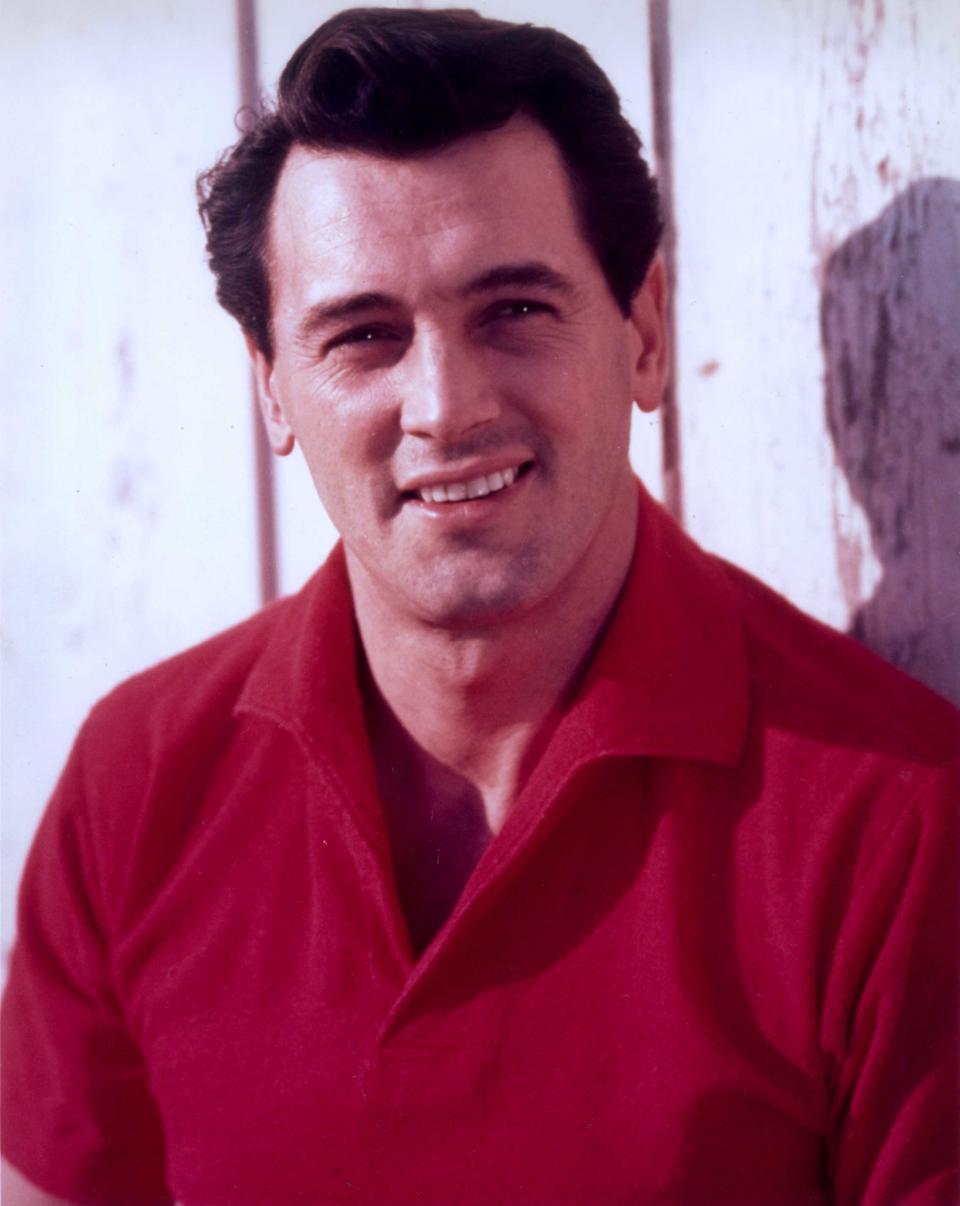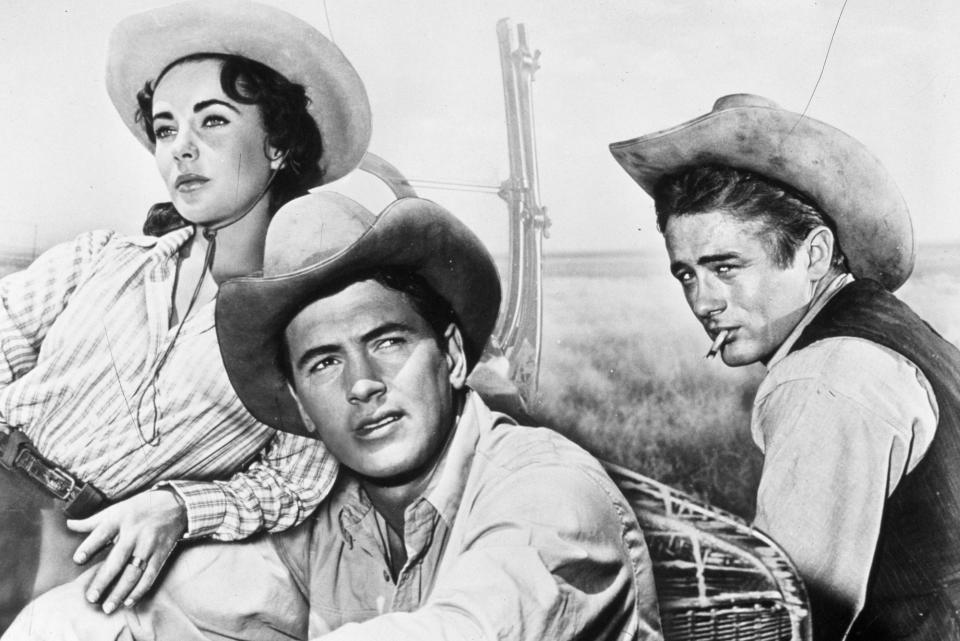How Rock Hudson Overcame Blackmail, Personal Obstacles to Become Hollywood’s Top Star
Rock Hudson’s former classmates at Illinois’ New Trier High School were surprised when he appeared in a small, uncredited role in 1948’s Fighter Squadron. Though he’d always been handsome, the tall, shy, soft-spoken boy they knew as Roy never let on that he wanted to be an actor.
Rock’s journey to stardom on the silver screen was complicated by a terrible childhood, his inherent bashfulness and his secret life as a gay man. “It’s a pretty remarkable achievement for this Winnetka boy to overcome so much,” says Mark Griffin, an associate producer and consultant on the new HBO documentary Rock Hudson: All That Heaven Allowed, bowing on June 28.
Today, Winnetka is a wealthy suburb of Chicago, but Rock, who was born Roy Harold Scherer Jr., didn’t come from money. His auto mechanic father abandoned Rock’s mother, Katherine, when Rock was 8. Her subsequent marriage to a former Marine officer brought them financial stability, but at a terrible cost. “Wallace Fitzgerald was an out-of-control drunk,” says Griffin, author of All That Heaven Allows: A Biography of Rock Hudson. “He’d fly into rages and assault both Rock and his mother.”
It’s hardly a surprise that Rock, despite his good looks, grew up trying to avoid attention. He never talked about wanting to be in movies, and even his closest friends didn’t know he was gay. Times were very different then. “In Winnetka, you were expected to announce you wanted to be a fireman or a police officer. You couldn’t have said you wanted to be in show business,” says Griffin. “It would be equivalent to announcing that you wanted to be a prima ballerina.”

Rock found work at the Postal Service before entering the Navy. Upon his discharge, he headed to California where he attempted to reconnect with his birth father. “The father gave Rock a job selling vacuum cleaners door-to-door, but Rock, being kind of awkward and tongue-tied, did not succeed,” says Griffin. “That created another wedge between father and son.”
In Hollywood, Rock landed some tiny walk-on parts, but he had to drive a truck to support himself. Things changed suddenly when he met Henry Wilson, an agent with a notorious reputation. “He was a sexual predator,” says Griffin, who explains that Rock was likely subjected to his casting couch. But Wilson knew how to make things happen. He changed his handsome new client’s name and inked a contract for him with Universal Studios for $125 a week.
Still, it took some time for the studio to recognize Rock’s star potential — especially after the actor froze, unable to say his line, during the filming of Fighter Squadron. Universal came very close to dropping Rock’s contract, but the actor slowly became more comfortable on screen, developing a naturalistic acting style that helped him connect with audiences. “I have no philosophy about acting or anything else. You just do it,” said Rock. “And I mean that. You just do it.”

Ross Hunter, who would later produce the 1959 hit Pillow Talk, is credited with recognizing Rock’s worth and making him the star of 1954’s Magnificent Obsession. The film, about a playboy who falls for the widow of a doctor whose death he inadvertently caused, put Rock on the A-list and nabbed an Oscar nomination for his co-star, Jane Wyman. “They hit the jackpot with that one,” Griffin says.
Once the spotlight found him, Rock made the most of it. Although he became most famous for his romantic roles, he lobbied hard to be cast as Elizabeth Taylor’s bigoted husband in 1956’s Giant. “Every leading man from Clark Gable to Alan Ladd was rumored to want it,” says Griffin. The meaty role would nab Rock his career’s sole Oscar nomination.
As Rock’s star rose, fan magazines became curious about his private life. To throw them off, Rock married Wilson’s secretary, Phyllis Gates, in 1955. “Initially, they really got on like a house on fire, but I think the arranged marriage situation really did not go well for either of them,” says Stephen Kijak, the director of the new HBO documentary. The pair divorced after three years. Marriage might have stopped the gossip, but the actor’s life as a gay man continued to make him vulnerable. “Rock was often under threat of blackmail or being extorted by the people close to him, including his companions,” says Griffin.
Lovers came and went, but Rock’s career always came first. He did whatever was necessary to protect it. “He really just loved to work,” says Kijak, who adds that despite his success, Rock never lost his inherent decency. “He emerges as one of the most giving actors, super professional and generous to a fault.”
Eleven years after his inauspicious film debut, Rock was voted the most popular movie star in the country. “He proved it’s possible to overcome any challenge in your life,” Griffin says. “Somehow, through his own resilience and persistence, he stayed true to his goal. He overcame obstacles and challenges that would have defeated anybody else. In some respects, I’ve come to think of Rock as superhuman.”
